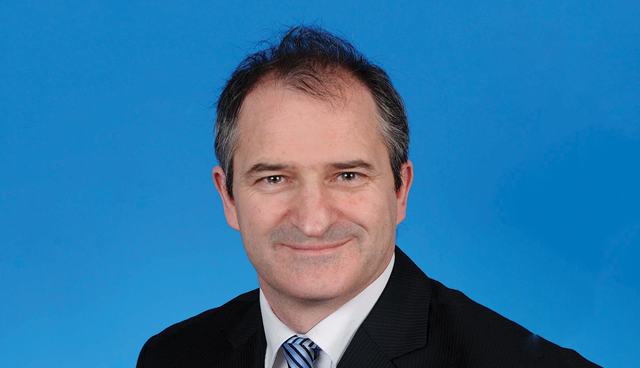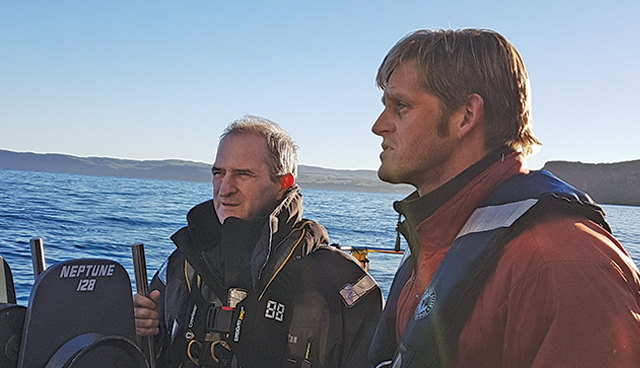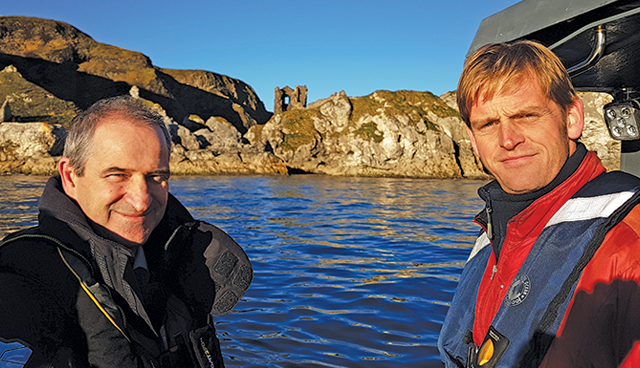A changing environment


Chief Executive of the Northern Ireland Environment Agency (NIEA), David Small, outlines the challenges and opportunities for the Agency in times of change.
In the absence of an Executive budget and no clear guidance on the final outcomes of Brexit, Small admits that his Agency, now operating within the Department of Agriculture, Environment and Rural Affairs (DAERA), is being stretched in terms of resource and manpower.
Describing the staffing and budgetary position as “difficult”, he says: “We are expecting further pressures in the next couple of years. The Agency was already responding and is dealing with the Voluntary Exit Scheme, which culminated in a loss of around 80 staff, individuals who had scientific and technical experience. This loss has impacted on our goals and our activities to achieve those goals and we expect further budgetary pressures going forward.
“At this point, the scale of those pressures is not clear, nor what impact they might have on programme spend, grant spend or indeed staffing, but I’m lucky to have passionate and dedicated staff who are committed to the primary goal of the Agency of protecting and improving the environment.”
NIEA is comprised of two divisions: the Natural Environment Division and the Resource Efficiency Division. The regulation of waste, water and industry are handled by the latter, while the Natural Environment Division handles the designation and protection of habitats and species.
The Agency, through the Natural Environment Division, also manages an extensive estate of country parks and nature reserves through which it promotes access to the countryside, understanding of the environment and contributes to health and well-being.
Small also leads the Environment Marine and Fisheries group within the Department. The extension of DAERA’s remit to include both environment and agriculture opened the door for greater collaboration and governance across the Department’s responsibilities.
In its role of policing the environment, the key goals of the Agency centre around:
- environmental regulation including waste;
- water quality; and
- wider habitat.
Environmental regulation
As a regulatory body, the Agency seeks to safeguard the quality of the environment through effective regulation. It has put a key focus on waste – both managing and controlling waste within the system, and tackling waste crime.
“Waste crime, as is the case in many of the UK’s regions and the Republic of Ireland, continues to be a major issue because the financial incentive is very significant. Within the system, we regulate operators and transporters through authorisations, permits and consents. Where environmental crime or illegal dumping is discovered, we move to enforce the law and seek prosecutions.”
Since 2002, the Agency has achieved over 600 convictions through the courts in relation to waste crimes. Small points out that significant resource and effort is dedicated to taking a case from an initial report to the Agency through to court conviction.
“I would like to see us build further our support, guidance and information offering with the wider industry.”
For this reason, he outlines ambitions for a stronger focus within the Agency on disruption and prevention. “This is already something that we are working on, aiming to stop the crime at the earliest possible stage. The Mobuoy case which is currently going through the courts (1.165 m3 of waste illegally landfilled close to the river Faughan, Derry) is an example of just how significant waste crime can be and we would like to turn our focus to prevention to try and avoid anything like that ever happening again.”
Water
Between 2011 and 2015 the Agency recorded a 25 per cent drop in water pollution incidents. While some of this reduction has been attributed to enforcement, there has also been an increasing emphasis on greater collaboration with the farming and wider industry. “The number of incidents being reduced is pleasing. We have also recently agreed a memorandum of understanding with the Ulster Farmers Union (UFU) that aims to deliver improved environmental outcomes. This will hopefully strengthen relationships with the UFU and the industry and give greater confidence to farmers to engage with the agency on key issues for information and guidance.
“We have a lot of critics in the farming industry and I have heard the term ‘environmental zealots’ being used. Actually though, if you look at our cross-compliance inspection programme, the number of breaches we report is actually fairly low in comparison to the 26,000 farm businesses that we work with. We are not out to get all farmers. I think our approach is a fair and reasonable one, however, where we need to, we will be firm. I would like to see us build further our support, guidance and information offering with the wider industry.”
Habitat
The Agency has a strong network of designated Areas of Special Scientific Interest (ASSIs), Special Protections Areas and Special Areas of Conservation, protected areas that represent the best of wildlife and geological sites that make a considerable contribution to the conservation of Northern Ireland’s most valuable natural places. Small’s team is focussed on improving the management of these sites through specially devised conservation management plans and working with farmers/land owners to ensure good environmental outcomes.

Climate
Greenhouse Gas emissions in Northern Ireland have been reduced from the 1990 baseline by some 17 per cent. The Agency recognises that achieving further reductions will require additional work and have been collaborating with other government departments and partners to bring forward initiatives and changes, particularly in the key areas of transport, agriculture and energy.
“There is more work to be done in this area after slow but steady progress. However, we will not be able to do this within the Agency or even the Department alone. Greater governance is important to ensure partner organisations are taking on board our advice and likewise, that we are working to achieve outcomes.”
Specialist support
Operating under the new Department, the agency has been required to provide a strong level of specialist support to wider departmental activities. An improved way of working, across boundaries, has seen it providing, and continuing to provide, technical support on departmental policy initiatives such as the Environmental Farming Scheme and the Interreg spending programmes.
“A major benefit of the shape of the new Department is the development of a better way of working across boundaries. As a policy initiative of the Department, NIEA continues to provide specialist support to the Environmental Farming Scheme. Similarly, we do this on other departmental programmes. For example, we have provided important input in terms of advice on TB, supporting that process with information around potential wildlife interventions. I think this approach is beginning to work well and benefiting the Department.”
He adds: “Undoubtedly, the range of challenges we face, is putting pressure on the Agency; and our capacity on just how much support we can deliver is limited. Like other departments and public bodies, more resources would help us contribute further, but I’m realistic about the resources we are likely to have available.”
As well as supporting the Department on its policy initiatives, the Agency also requires support from partner organisations to realise its own ambitions. The Environment Fund supports partner organisations who can help the Agency deliver on its environmental goals. Last year the Agency paid out some £2.5 million to such partners, who use this to secure significant sums of match funding for other sources, and will aim to do similar in the coming year, subject to budget.
The circular economy, aiming to decouple economic development from virgin material inputs, starting at the design stage and continuing through to the end of life of a product, provides opportunities to minimise raw material usage by extracting greater value from materials that previously would have been classified as waste, and treated as such. It is a policy the Agency has promoted and continues to liaise with wider departmental colleagues and other interested stakeholders on. However, promoting this and natural capital (the provision of clean air and water, carbon capture, flood alleviation, productivity of lands and waters, tourism and health and wellbeing benefits) must be weighed against the Department’s and Agency’s statutory obligations, where primary resources must also be focussed.
“I think we can clearly see the benefits of the circular economy approach. We’ve had some discussions with our colleagues in the Department for the Economy, around the Programme for Government and trying to reflect the circular economy within it. However, we are still at a very early stage. My concern is that as budgets squeeze and tighten, our ability to plan where we might go on those kinds of policy initiatives going forward becomes more difficult. The statutory obligations that we have to meet tend to be where resources are initially focussed and it means that the strategic policy thinking space to progress some of those wider, broader initiatives is more difficult to find.”

Programme for Government
The Department is being guided by the environmental outcome within the Programme for Government of ‘we live and work sustainability – protecting the environment’. Key indicators have been identified as measures of whether this outcome is being achieved. As well as leading on projects that will help towards these indicators, the cross-departmental collaboration encouraged by the new format of the Programme for Government also means an increased governance role for the Agency, ensuring that initiatives being taken forward by other departments and partner organisations are done so on a shared outcomes basis.
“My concern is that as budgets squeeze and tighten, our ability to plan where we might go on those kinds of policy initiatives going forward becomes more difficult.”
“Some of our own initiatives and work programmes such as those around waste, will help to deliver the outcomes of the household waste indicator in the Programme for Government, however, this indicator and the others we are leading on also require additional work and input from a range of other partners. This will require robust governance, which I will be putting in place. We will rely a lot on partner organisations, including other departments, to help us deliver outcomes. Air quality, for example, will require collaboration with the Department for Infrastructure around transport infrastructure initiatives and modal shifts on how people travel. Similar collaboration will be required from other partners against our other PfG indicators.”
Brexit
Strategic development within the agency and the wider department is competing for resources with Brexit. For this reason, the Agency and wider Department have sought additional resources to build greater capacity to deliver Brexit. This should largely allow relevant teams to continue to focus on the internal policies discussed previously. “The same colleagues who would contribute to the work around the circular economy are also dealing with Brexit and various other pressures, for example beginning to work their way through the extensive review of legislation that we are undertaking to plan for our exit from the EU.
“We are trying to bring in greater resources across the Department for Brexit. This will hopefully allow us greater capacity to continue to deliver our other non-Brexit priorities. But Brexit is another pressure that we are having to absorb. Small concludes by stating that the Agency will continue to be an advocate for the environment and to safeguard Northern Ireland’s natural resources. “That’s our primary purpose and we will continue to deliver it. Environmental and economic outcomes will be supported by activities which the Agency will encourage and support,” he adds.





